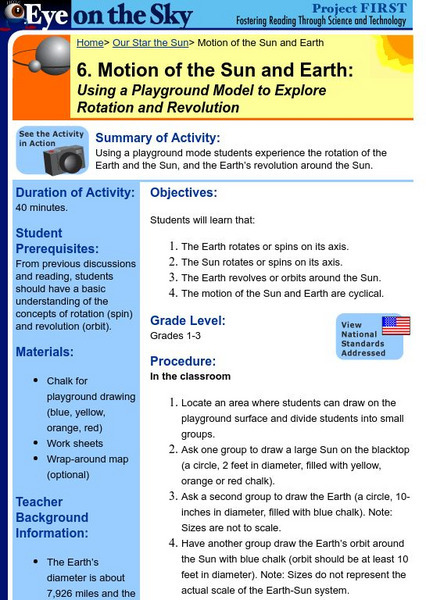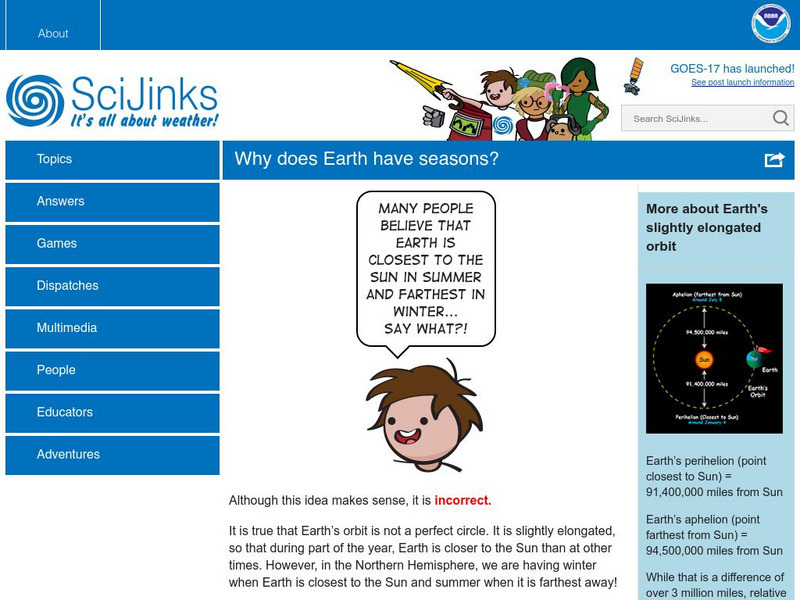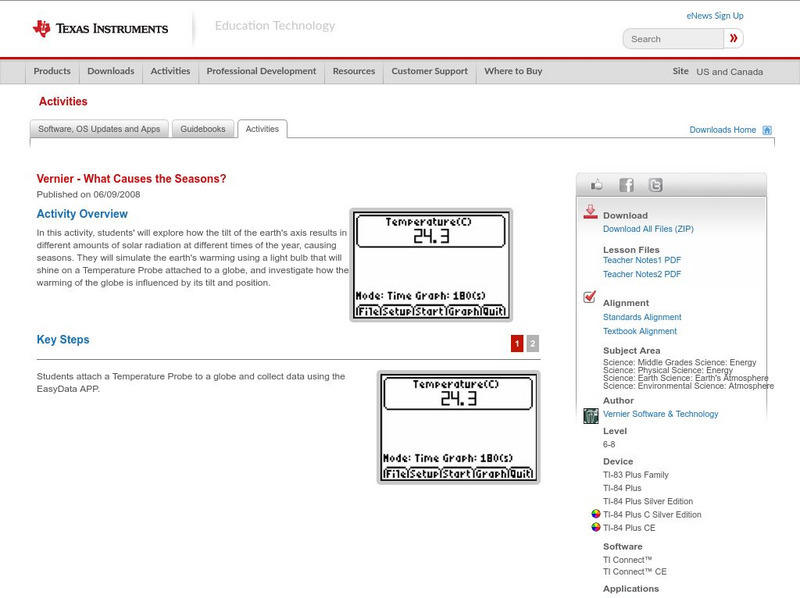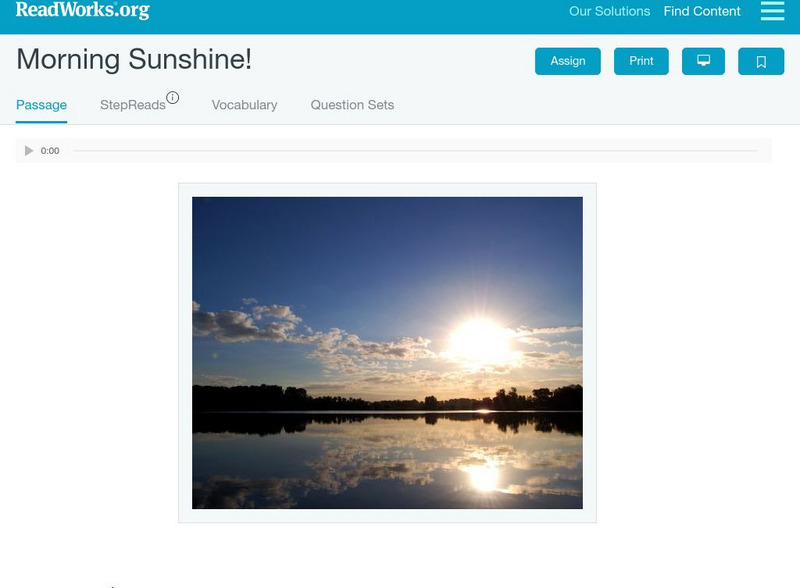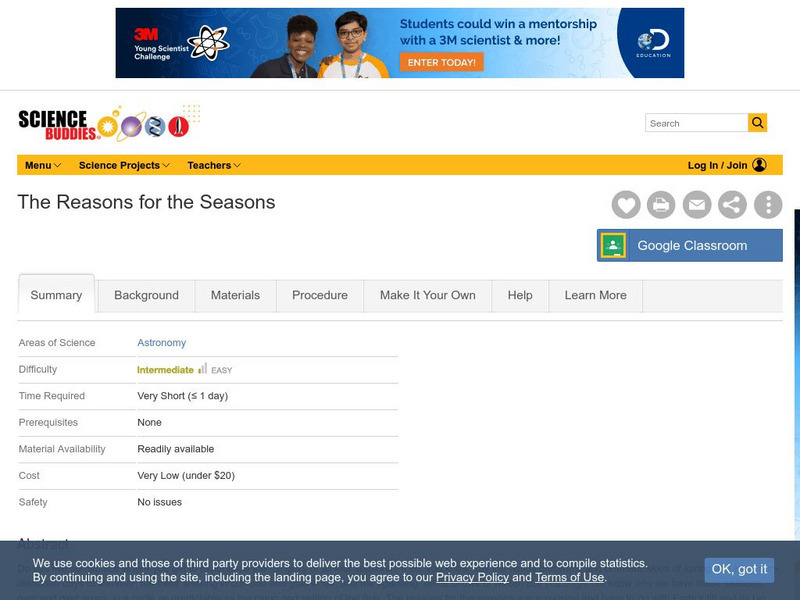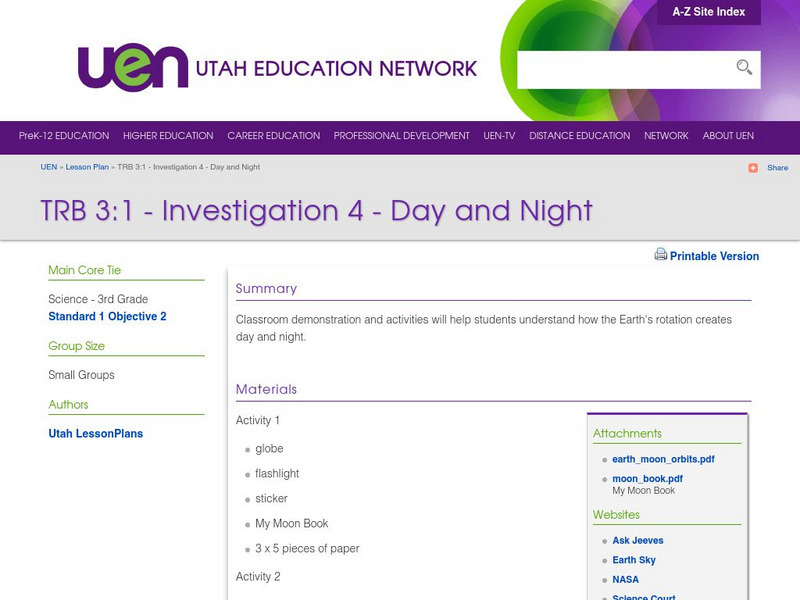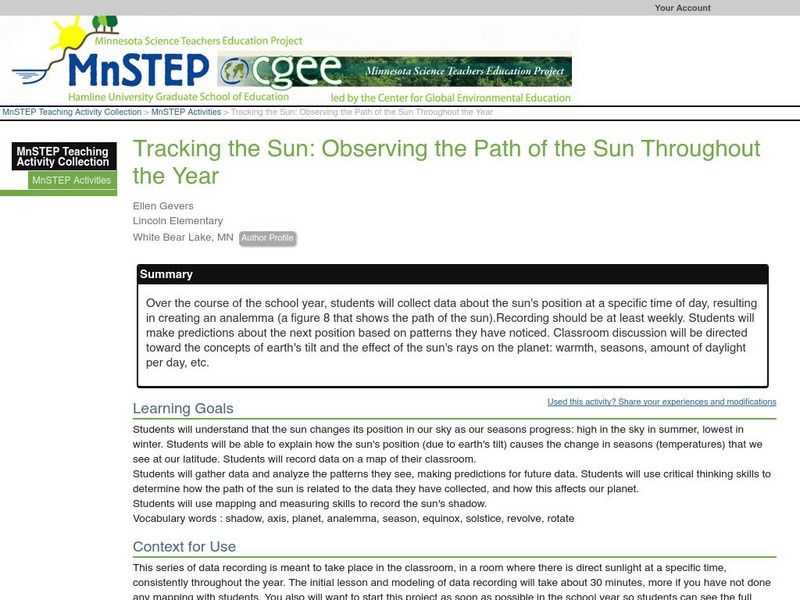Other
Center for Science Education: Eye on the Sky: Motion of the Sun and Earth
Students model the interaction of the earth and the sun. The activity is designed for the playground. You will need chalk, but all the other worksheets are provided.
Geography 4 kids
Geography4 kids.com: Earth Around the Sun
Find out what all results from Earth revolving around the sun every 365 days as well as the rotation of the Earth every 24 hours.
Science Education Resource Center at Carleton College
Serc: Mn Step: Rotation of the Earth
A KWL activity combined with a demonstration model. Students record their ideas and questions about why we have day and night. They then shine a flashlight (the Sun) on a rotating styrofoam ball (the Earth) and record their observations....
NASA
Nasa: Sci Jinks: What's a Solstice?
Find out how the Earth's tilted axis affects the seasons on the Earth.
Utah Education Network
Uen: As the World Turns
Third graders use their bodies to act out the motions of earth.
Utah Education Network
Uen: A Moon With a View
Understand the rotation of the earth and the appearance of movement of other bodies in the sky.
NASA
National Aeronautics and Space Administration: Scijinks: Seasons
An explanation about the rotation of the Earth and why the Earth has seasons.
Texas Instruments
Texas Instruments: What Causes the Seasons?
In this activity, students' will explore how the tilt of the earth's axis results in different amounts of solar radiation at different times of the year, causing seasons. They will simulate the earth's warming using a light bulb that...
University of Illinois
University of Illinois Extension: Tree House Weather Kids: What Causes the Season?
Explore what causes the change of seasons on the Earth.
Scholastic
Scholastic: Study Jams! Science: Weather & Climate: Seasons
A slideshow and a short multiple-choice quiz on the topic of seasons and how they are caused by the Earth's rotation and orbit.
Read Works
Read Works: Morning Sunshine
[Free Registration/Login Required] Students read about how the tilt of the Earth on its axis affects sunrises and sunstes. A question sheet is available to help students build skills in reading comprehension.
National Museums Liverpool
Liverpool Museums: The Sun Tracker
This simulation allows the user to see the sun's arc in the sky anywhere in the world at any time. By changing the season settings the user can see how seasons affect the height of the sun's arc.
Science Buddies
Science Buddies: Project Ideas: The Reasons for the Seasons
In this astronomy science fair project, investigate how the earth's axial tilt creates seasons. The Science Buddies project ideas are set up consistently beginning with an abstract, objective, and introduction, followed by a section on...
Cornell University
Cornell University: Astronomy: Eratosthenes
Learn how Greek mathematician Eratosthenes used geometry to estimate the circumference of the Earth.
Science Struck
Science Struck: A Scientific Explanation to What Causes Day and Night
Explains how the rotation and the axial tilt of the Earth are responsible for the phenomenon of day and night. Provides information about the Sun, the solar system, and the Earth, and how the circumference of the Earth was first measured...
Utah Education Network
Uen: Trb 3:1: Investigation 4: Day and Night
A lesson plan for third graders in which they learn about the rotation of the Earth on its axis and how this movement creates day and night. They also examine the orbit of the moon about the Earth and the Earth's orbit around the sun.
Other
Center for Science Education: Eye on the Sky: What Makes Day and Night?
This activity will allow you to model day and night cycles. A rotating student holding a map (provided) models the earth. A lamp is used to model the sun. Numerous worksheets (pdf) and additional website resources are also provided.
McREL International
Mcrel.org: Planet Rotation [Pdf]
A worksheet regarding the axis of rotation within each of the planets. PDF
ClassFlow
Class Flow: Day and Night
[Free Registration/Login Required] In this flipchart students will understand how the Earth rotates during a 24 hour period giving us day and night.
Utah Education Network
Uen: Trb 3:1 Investigation 6 Celestial Model
Third graders will gain an understanding of why stars appear to move across the night sky.
Science Education Resource Center at Carleton College
Serc: Tracking the Sun: Observing the Path of the Sun Throughout the Year
Over the course of the school year, students collect weekly data about the sun's position at a specific time of day, resulting in creating a figure "8" that shows the path of the sun called an analemma.
E-learning for Kids
E Learning for Kids: Science: Atlantic Ocean: Day and Night
This module explores day and night. Learn about what we see during the day and night and why we see what we see.
Better Lesson
Better Lesson: Our Stars
For this lesson, learners will observe and communicate how the stars are in the sky both day and night. The extremely detailed lesson includes photos and videos of the lesson in actions, examples of student's work, materials, parent...
Better Lesson
Better Lesson: Our Sky
What objects are in the day sky and the night sky? How do they seem to move? Come and explore with us as we discover the sun, moon, planets and stars! This detailed lesson plan includes pictures and videos of the lesson in action,...
